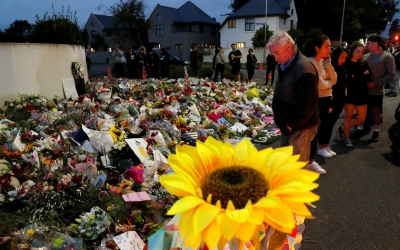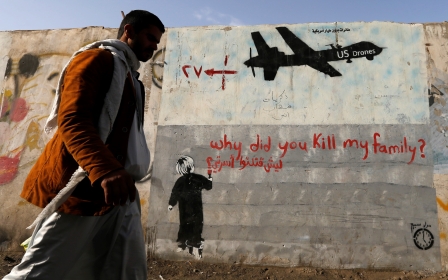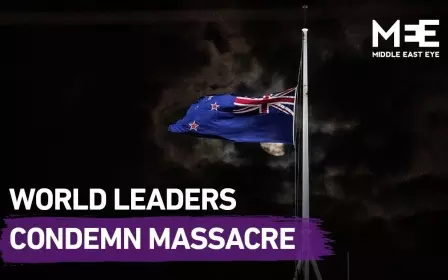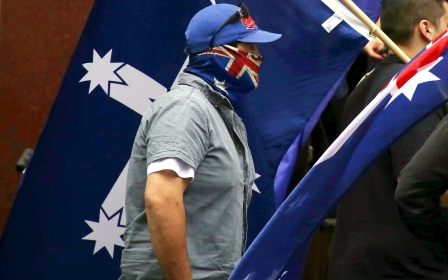British Muslims urged to remain 'vigilant' after attacks at five mosques
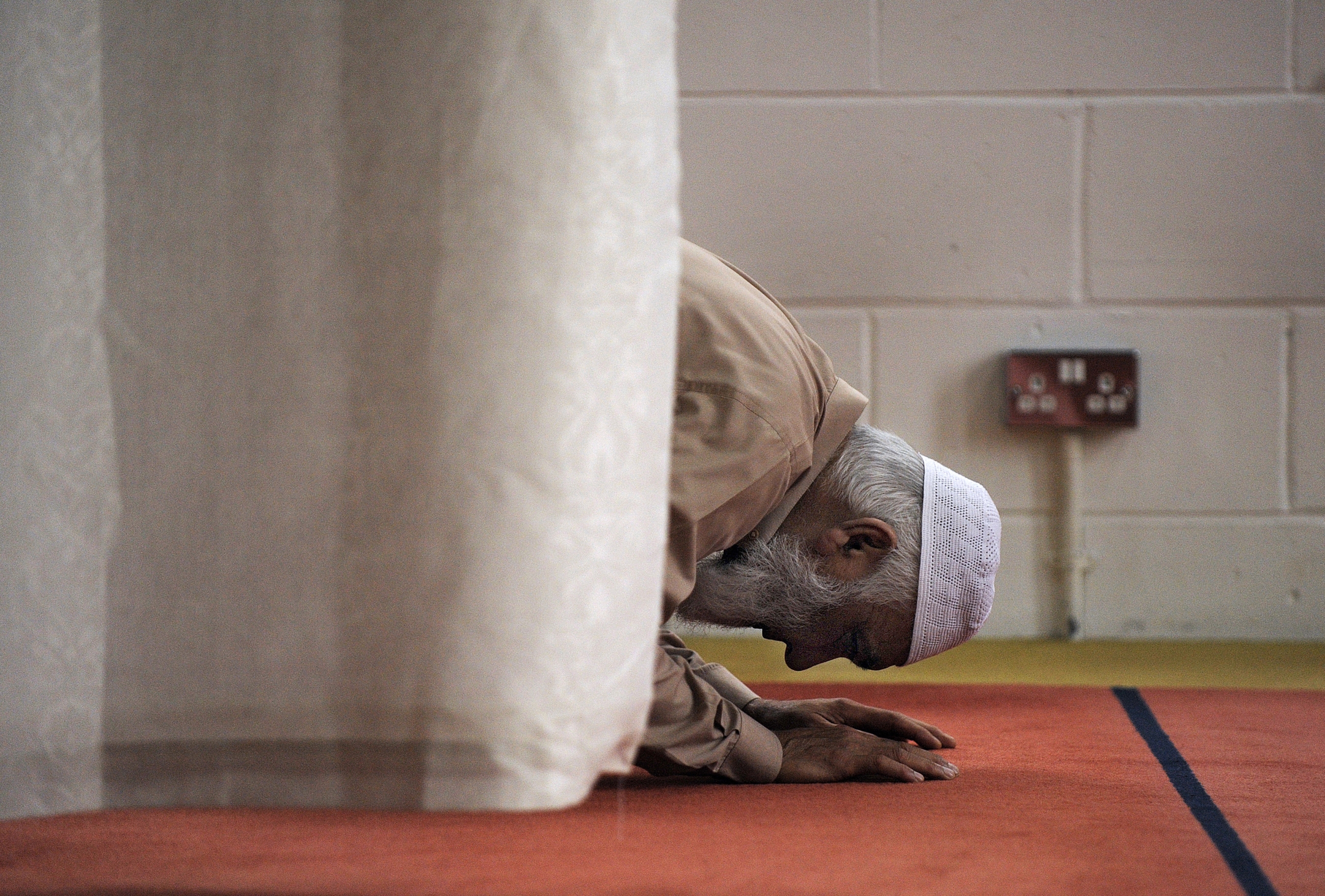
A Muslim community group has called for “vigilance and resilience” after a counter-terrorism investigation was opened on Thursday into attacks on five mosques - including one involving a sledgehammer - in the city of Birmingham.
The probe comes days after the British government announced an increase in funding to help secure places of worship as British Muslims fend off Islamophobic attacks in the wake of the New Zealand mosque attack that left 50 dead.
A spokesperson for Witton Islamic Centre said CCTV captured a man smashing windows in the early hours of Thursday's morning.
"The whole of the front windows, about six, were smashed," he told the BBC. "Because of the force he used, it's gone through the windows and into the mosque itself".
New MEE newsletter: Jerusalem Dispatch
Sign up to get the latest insights and analysis on Israel-Palestine, alongside Turkey Unpacked and other MEE newsletters
Soon after, West Midlands police began to receive further reports of similar incidents at Muslim places of worship in the region. The force said officers from its counter-terrorism unit were investigating and had yet to establish a motive.
'Birmingham's mosques are a place of worship, serenity and a source of peace and tranquillity. We are appalled by such acts of hate'
- Birmingham Council of Mosques
Mosque leaders in Birmingham, a city with one of the largest concentration of Muslims in Britain, said they were “appalled” by the attacks.
"We were deeply horrified to hear a number of mosques were vandalised during the early hours of this morning,” the Birmingham Council of Mosques said in a statement.
"Birmingham's mosques are a place of worship, serenity and a source of peace and tranquillity. We are appalled by such acts of hate/terror."
A spokesperson for the Muslim Council of Britain described the incidents as “shocking” and called for “vigilance and resilience”.
"It is shocking to see how someone has chosen to use a sledgehammer to attack mosques and even a Muslim girls' school.
“We will be reiterating our messages of vigilance and resilience to mosques up and down the country, and hope police forces and the government not only recognise the level of threat across the country, but work with Muslim groups to help tackle Islamophobia wherever it takes place."
Underestimating vulnerability
On Tuesday, Home Secretary Sajid Javid announced that £5m will be made available to offer security training to houses of worship.
He also said he will double funds to helps churches, mosques, temples and gurdwaras in England and Wales install alarms and CCTV to deter attackers to £1.6m. A similar fund in the Jewish community is set to rise to £14m per year.
The Muslim Council of Britain welcomed the funding boost, but claimed that the funding “was not proportionate to the risk” that Muslims face.
“The increase in the Places of Worship fund, the simplified bidding process and the investment in non-physical security support, are all welcome first steps, in particular given the heightened concerns following the terrorist incidents targeting Muslims in New Zealand and at a smaller level, here in the UK," a spokesperson said earlier this week.
“However, British Muslim communities may still question why the funding is not proportionate to the risks they face, given the Home Office's own figures last year showing that over half of religious hate crime is targeted at Muslims.”
Zubaidah Haque, Deputy Director of the independent race equality think-tank Runnymede Trust, told Middle East Eye that the government may have “underestimated the vulnerability of Muslim communities who now represent over half of the religious-based hate crimes in this country".
“The New Zealand terrorist attack was a poignant reminder how vulnerable places of worship are - just because they open their doors and welcome people from all backgrounds,” she added.
'Decades in the making'
The Birmingham mosque attacks come as British Muslims continue to face Islamophobic incidents, some of which have been inspired by the New Zealand mosque massacre.
In a letter to the Guardian on Monday, mosque and community leaders said attacks against Muslims were being fuelled by “institutionalised Islamophobia".
“The massacre of Muslims did not just begin with bullets fired from the barrel of Tarrant’s gun," the letter said. "Rather it was decades in the making: inspired by Islamophobic media reports, hundreds and thousands of column inches of hatred printed in the press, many Muslim-hating politicians and unchecked social media bigotry."
Marking International Day for the Elimination of Racial Discrimination on Thursday, the United Nations condemned the New Zealand Mosque attack, describing it as an “Islamophobic terrorist attack".
“This tragic event reminds us that racism, xenophobia and religious hatred are deadly and that the result of ethno-nationalist populism and supremacist ideologies is racial violence, exclusion and discrimination,” a statement released by two special rapporteurs said.
E Tendayi Achiume, special rapporteur on contemporary forms of racism, racial discrimination, xenophobia and related intolerance, and Michael Balcerzak, chair of the Working Group of Experts on People of African Descent, called on states to “achieve racial equality and stop using nationalist populist rhetoric to stoke discrimination".
“States and leaders have deployed political rhetoric that demonises racialised groups and emboldens supremacist ideologues. Some states even deny the existence of racial discrimination or minorities within their borders.
"Every single person, especially those who enjoy racial privilege on a daily basis, must play their part to put an end to the racism, xenophobia and related intolerance that prevail today.”
Middle East Eye delivers independent and unrivalled coverage and analysis of the Middle East, North Africa and beyond. To learn more about republishing this content and the associated fees, please fill out this form. More about MEE can be found here.


